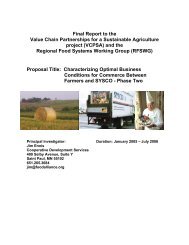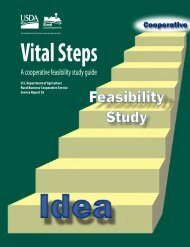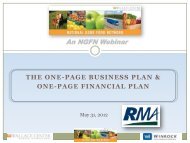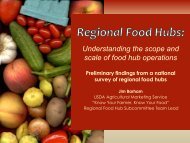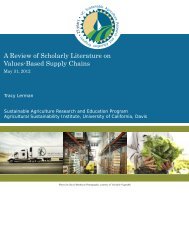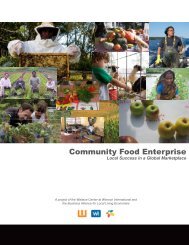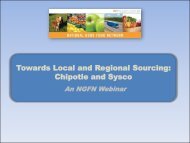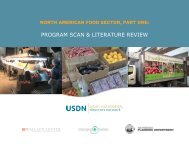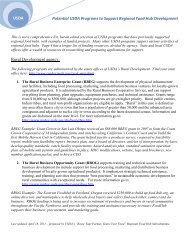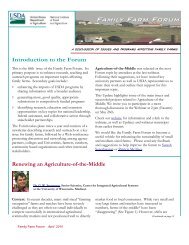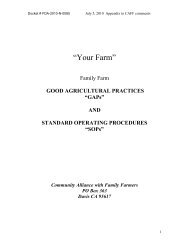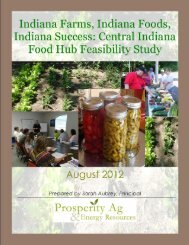- Page 3: THE COMMON MARKET FEASIBILTY STUDYT
- Page 9 and 10: THE COMMON MARKET FEASIBILTY STUDYE
- Page 13 and 14: THE COMMON MARKET FEASIBILTY STUDYE
- Page 15 and 16: THE COMMON MARKET FEASIBILTY STUDYE
- Page 17 and 18: THE COMMON MARKET FEASIBILTY STUDYE
- Page 19 and 20: THE COMMON MARKET FEASIBILTY STUDYE
- Page 21 and 22: THE COMMON MARKET FEASIBILTY STUDYI
- Page 23: THE COMMON MARKET FEASIBILTY STUDYI
- Page 28 and 29: THE COMMON MARKET FEASIBILTY STUDYC
- Page 30 and 31: THE COMMON MARKET FEASIBILTY STUDYC
- Page 32 and 33: THE COMMON MARKET FEASIBILTY STUDYC
- Page 34 and 35: THE COMMON MARKET FEASIBILTY STUDY3
- Page 36 and 37: THE COMMON MARKET FEASIBILTY STUDYD
- Page 38 and 39: THE COMMON MARKET FEASIBILTY STUDYD
- Page 40 and 41: THE COMMON MARKET FEASIBILTY STUDYD
- Page 42 and 43: THE COMMON MARKET FEASIBILTY STUDYS
- Page 44 and 45: THE COMMON MARKET FEASIBILTY STUDYS
- Page 46 and 47: THE COMMON MARKET FEASIBILTY STUDYS
- Page 48 and 49: THE COMMON MARKET FEASIBILTY STUDYS
- Page 50 and 51: THE COMMON MARKET FEASIBILTY STUDYS
- Page 52 and 53: THE COMMON MARKET FEASIBILTY STUDYF
- Page 54 and 55: THE COMMON MARKET FEASIBILTY STUDYF
- Page 56 and 57: THE COMMON MARKET FEASIBILTY STUDYF
- Page 58 and 59: THE COMMON MARKET FEASIBILTY STUDYB
- Page 60 and 61: THE COMMON MARKET FEASIBILTY STUDYB
- Page 62 and 63: THE COMMON MARKET FEASIBILTY STUDYE
- Page 64 and 65: THE COMMON MARKET FEASIBILTY STUDYE
- Page 66 and 67: THE COMMON MARKET FEASIBILTY STUDYE
- Page 68 and 69: THE COMMON MARKET FEASIBILTY STUDYE
- Page 70 and 71: THE COMMON MARKET FEASIBILTY STUDYE
- Page 72 and 73: THE COMMON MARKET FEASIBILTY STUDYE
- Page 74 and 75:
THE COMMON MARKET FEASIBILTY STUDYE
- Page 76 and 77:
THE COMMON MARKET FEASIBILTY STUDYE
- Page 78 and 79:
THE COMMON MARKET FEASIBILTY STUDYE
- Page 80 and 81:
THE COMMON MARKET FEASIBILTY STUDYE
- Page 82 and 83:
THE COMMON MARKET FEASIBILTY STUDYE
- Page 84 and 85:
THE COMMON MARKET FEASIBILTY STUDYE
- Page 86 and 87:
THE COMMON MARKET FEASIBILTY STUDYC
- Page 88 and 89:
THE COMMON MARKET FEASIBILTY STUDYC
- Page 90 and 91:
THE COMMON MARKET FEASIBILTY STUDYC
- Page 92 and 93:
THE COMMON MARKET FEASIBILTY STUDYA
- Page 94 and 95:
THE COMMON MARKET FEASIBILTY STUDYA
- Page 96 and 97:
THE COMMON MARKET FEASIBILTY STUDYA
- Page 98 and 99:
THE COMMON MARKET FEASIBILTY STUDYA
- Page 100 and 101:
THE COMMON MARKET FEASIBILTY STUDYA
- Page 102 and 103:
THE COMMON MARKET FEASIBILTY STUDYA
- Page 104 and 105:
THE COMMON MARKET FEASIBILTY STUDYA
- Page 106 and 107:
THE COMMON MARKET FEASIBILTY STUDYA
- Page 108 and 109:
THE COMMON MARKET FEASIBILTY STUDYA
- Page 110 and 111:
THE COMMON MARKET FEASIBILTY STUDYA
- Page 112 and 113:
THE COMMON MARKET FEASIBILTY STUDYA
- Page 114 and 115:
THE COMMON MARKET FEASIBILTY STUDYA
- Page 116 and 117:
THE COMMON MARKET FEASIBILTY STUDYA
- Page 118 and 119:
THE COMMON MARKET FEASIBILTY STUDYA
- Page 120 and 121:
THE COMMON MARKET FEASIBILTY STUDYA
- Page 122 and 123:
THE COMMON MARKET FEASIBILTY STUDYA
- Page 124 and 125:
THE COMMON MARKET FEASIBILTY STUDYA
- Page 126 and 127:
THE COMMON MARKET FEASIBILTY STUDYA
- Page 128 and 129:
THE COMMON MARKET FEASIBILTY STUDYA
- Page 130 and 131:
THE COMMON MARKET FEASIBILTY STUDYA
- Page 132 and 133:
THE COMMON MARKET FEASIBILTY STUDYA
- Page 134 and 135:
THE COMMON MARKET FEASIBILTY STUDYA
- Page 136 and 137:
THE COMMON MARKET FEASIBILTY STUDYA
- Page 138 and 139:
THE COMMON MARKET FEASIBILTY STUDYA
- Page 140 and 141:
THE COMMON MARKET FEASIBILTY STUDYA
- Page 142 and 143:
THE COMMON MARKET FEASIBILTY STUDYA
- Page 144 and 145:
THE COMMON MARKET FEASIBILTY STUDYA
- Page 146 and 147:
THE COMMON MARKET FEASIBILTY STUDYA
- Page 148 and 149:
THE COMMON MARKET FEASIBILTY STUDYA
- Page 150 and 151:
THE COMMON MARKET FEASIBILTY STUDYA
- Page 152 and 153:
THE COMMON MARKET FEASIBILTY STUDYA
- Page 154 and 155:
THE COMMON MARKET FEASIBILTY STUDYA
- Page 156 and 157:
THE COMMON MARKET FEASIBILTY STUDYA
- Page 158 and 159:
THE COMMON MARKET FEASIBILTY STUDYA
- Page 160 and 161:
THE COMMON MARKET FEASIBILTY STUDYA
- Page 162 and 163:
THE COMMON MARKET FEASIBILTY STUDYA
- Page 164 and 165:
THE COMMON MARKET FEASIBILTY STUDYA
- Page 166 and 167:
THE COMMON MARKET FEASIBILTY STUDYA
- Page 168 and 169:
THE COMMON MARKET FEASIBILTY STUDYA
- Page 170 and 171:
THE COMMON MARKET FEASIBILTY STUDYA
- Page 172 and 173:
THE COMMON MARKET FEASIBILTY STUDYA
- Page 174 and 175:
THE COMMON MARKET FEASIBILTY STUDYA
- Page 176 and 177:
THE COMMON MARKET FEASIBILTY STUDYA
- Page 178 and 179:
THE COMMON MARKET FEASIBILTY STUDYA
- Page 180 and 181:
THE COMMON MARKET FEASIBILTY STUDYA
- Page 182 and 183:
THE COMMON MARKET FEASIBILTY STUDYA
- Page 184 and 185:
THE COMMON MARKET FEASIBILTY STUDYA
- Page 186 and 187:
THE COMMON MARKET FEASIBILTY STUDYA
- Page 188 and 189:
THE COMMON MARKET FEASIBILTY STUDYA
- Page 190 and 191:
THE COMMON MARKET FEASIBILTY STUDYA
- Page 192 and 193:
THE COMMON MARKET FEASIBILTY STUDYA
- Page 194 and 195:
THE COMMON MARKET FEASIBILTY STUDYA
- Page 196 and 197:
THE COMMON MARKET FEASIBILTY STUDYA
- Page 198 and 199:
THE COMMON MARKET FEASIBILTY STUDYA
- Page 200 and 201:
THE COMMON MARKET FEASIBILTY STUDYA
- Page 202 and 203:
THE COMMON MARKET FEASIBILTY STUDYA
- Page 204 and 205:
THE COMMON MARKET FEASIBILTY STUDYA
- Page 206 and 207:
THE COMMON MARKET FEASIBILTY STUDYA
- Page 208 and 209:
THE COMMON MARKET FEASIBILTY STUDYA
- Page 210 and 211:
THE COMMON MARKET FEASIBILTY STUDYA
- Page 212 and 213:
THE COMMON MARKET FEASIBILTY STUDY2
- Page 214 and 215:
THE COMMON MARKET FEASIBILTY STUDYS
- Page 216 and 217:
THE COMMON MARKET FEASIBILTY STUDYA
- Page 218 and 219:
THE COMMON MARKET FEASIBILTY STUDYC
- Page 220 and 221:
THE COMMON MARKET FEASIBILTY STUDYA
- Page 222 and 223:
THE COMMON MARKET FEASIBILTY STUDYA
- Page 224 and 225:
THE COMMON MARKET FEASIBILTY STUDYA
- Page 226 and 227:
THE COMMON MARKET FEASIBILTY STUDYA
- Page 228 and 229:
THE COMMON MARKET FEASIBILTY STUDYA
- Page 230 and 231:
THE COMMON MARKET FEASIBILTY STUDYA
- Page 232 and 233:
THE COMMON MARKET FEASIBILTY STUDYA
- Page 234 and 235:
THE COMMON MARKET FEASIBILTY STUDYA
- Page 236 and 237:
THE COMMON MARKET FEASIBILTY STUDYA
- Page 238 and 239:
THE COMMON MARKET FEASIBILTY STUDYA
- Page 240:
THE COMMON MARKET FEASIBILTY STUDYA



